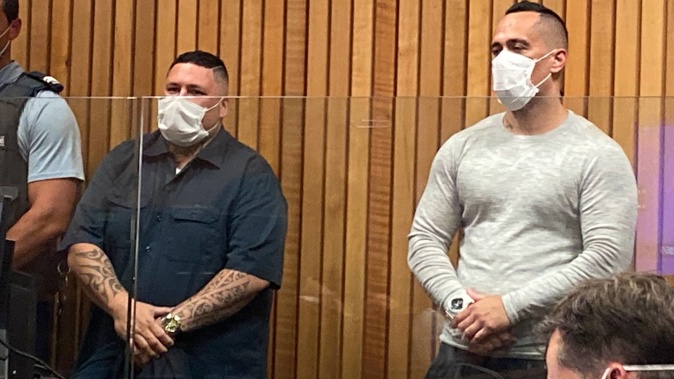
/cloudfront-ap-southeast-2.images.arcpublishing.com/nzme/GVTUITHPWVKFU7LYQQGVZ4322M.jpg)
A Black Power president is appealing against his manslaughter conviction for the slaying of a rival gang member on the grounds he was convicted for being the boss.
Patched Mongrel Mob member, Kevin Neihana Ratana, was shot dead in broad daylight on the front lawn of his partner's home in Whanganui's Castlecliff area on August 21, 2018, by a group of Black Power members.
Whanganui Black Power president Damien Shane Kuru was sentenced by Justice Rebecca Ellis in the High Court at Whanganui to five years and two months' imprisonment in February this year for his part in Ratana's death.
The 42-year-old and the gang's Sergeant at Arms, Gordon Anthony Runga, had been found guilty of manslaughter by a jury in November 2021 following a six-week trial, where they were charged with Ratana's murder.
Kuru applied to the Court of Appeal to challenge the conviction on three grounds, including the evidence given by a detective inspector about the role of a gang president should not have gone before a jury, because any probative value was far outweighed by the potential unfair prejudice.
He also claims the conviction was not supported by the evidence at trial and the trial judge misdirected the jury.
The Court of Appeal will hear Kuru's case on in October in Wellington.
During Kuru's murder trial evidence was given by a police detective inspector Craig Scott claiming he would have expected the killing could have only been carried out under the orders of the gang president.
Dr Jarrod Gilbert, an authority on gangs, in an opinion piece prepared for the trial said while he broadly agreed with the statement, he strongly warned against an overreliance on such beliefs when examining specific incidents.
He said individual chapters operated differently, while in some, members rarely acted without the president's knowledge, and in others, the president sought consensus by holding a vote.
There could also be a breakdown in the internal politics of a gang or events could happen quickly and without planning, he said.
"In such cases there will be various factions within a chapter and the president may have little or no control over certain members or specific actions.
"The gangs certainly have a level of discipline and structure but ultimately they are made up of rebellious and difficult-to-control men."
/cloudfront-ap-southeast-2.images.arcpublishing.com/nzme/GE6QHMN32YHL26ZHV5KEFTBSVA.jpg)
Mongrel Mob member Kevin Ratana, aka Kastro, was gunned down on the front lawn of his partner's home in Puriri St, Castlecliff, Whanganui on August 21, 2018. Photo / Supplied
Gilbert said in many instances relying on generality alone would lead to conclusions that were demonstrably unsafe.
Before Ratana's death there had been a previous encounter between him and two Black Power members that ended when the mobster pulled out a shotgun and scared the pair off, Justice Ellis told the court during sentencing.
On other occasions, Black Power members did drive-bys of Ratana's home yelling gang slogans.
During the hearing Justice Ellis described the plan hatched, to go to Ratana's address for a rumble and scare him out of Castlecliff, as not very well thought through and amateurishly executed.
She also outlined the facts on which Kuru had been found guilty.
"There was no evidence of your direct involvement in either the formation of the plan or its execution," she told the court.
Given the location of Kuru's home, which was also Black Power's headquarters, she was sure he knew Ratana had been effectively living around the corner for quite a few weeks.
Justice Ellis said while she doubted Kuru had any advance notice of what was planned, the jury must have inferred from the arrival of cars and the congregation of a group of armed gang members, outside Kuru's house, that he must have found out pretty quickly.
"And the jury by their verdicts must have found that once you had that knowledge, and by dint of your presence and your innate authority, you effectively encouraged the other participants to execute their plan."
During the sentencing Justice Ellis accepted Kuru's commitment to the idea he could have a pro-social influence on disenfranchised people drawn into gang life within the Whanganui community.
While police and the Crown were often sceptical about such claims, Justice Ellis had no doubt Kuru's devotion to the cause was real as he had already been heavily involved for years.
"In your case, Mr Kuru, I accept it as not a front and that your activities are genuine.
"I hope you will not be deterred in your endeavours by the sentence that I will eventually impose today. I think you have the wherewithal, the brains, the ability and the motivation to make a real difference to your community."
In April Kuru, who has a final release date of December 2023, was seen by the Parole Board which declined his release. He will again appear for parole before the end of April 2023.
Open Justice sought an interview with Kuru at Whanganui's Kaitoke Prison in March but permission has been delayed as the Department of Corrections carries out a detailed consultation process.
In total six Black Power members were sentenced to imprisonment for Ratana's killing.
Runga was sentenced to seven years' jail while Anthony Kuru was sentenced to five years and three months' imprisonment after pleading guilty to manslaughter.
Hikitia Rawiri Hakaraia, known as Hikitia Box, was jailed for nine years and seven months after pleading guilty to manslaughter and another unrelated killing in April 2018.
Sheldon Rogerson pleaded guilty to being party to murder and was sentenced to six years and four months' jail while Damien Charles Fantham-Baker was imprisoned for five years and 10 months.
- Leighton Keith, Open Justice - NZ Herald
Take your Radio, Podcasts and Music with you









